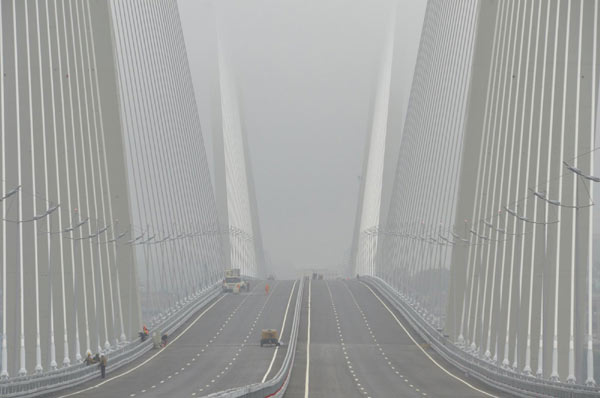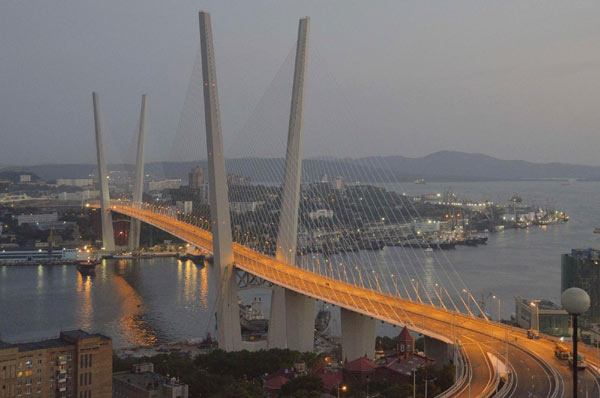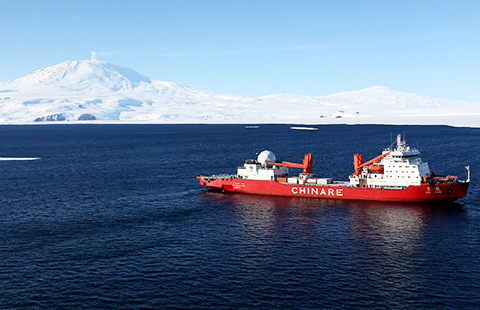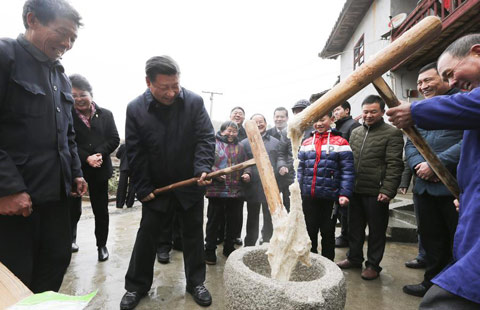

 |
|
Construction workers are seen on the newly built bridge across the Golden Horn bay in Russia's far-eastern port of Vladivostok, Aug 9, 2012. [Photo/Agencies] |
VLADIVOSTOK, Russia - Vladimir Lenin's vision of developing Russia's far east would not be out of place in President Vladimir Putin's talking points for the Asia-Pacific Economic Cooperation (APEC) summit he is hosting this week in the Pacific port of Vladivostok.
"We will propose that capital from developed countries construct a super-highway between London, Moscow, Vladivostok and Beijing," said the plan, endorsed in 1922 by the Soviet revolutionary leader. "We will tell them that it will open up the untold riches of Siberia."
Ninety years on, the Kremlin has redecorated Russia's window on the east in the hope of improving its image in the eyes of investors from the world's fastest-growing region, and reviving its flagging popularity.
Russia completed a 9,300-km (5,800-mile) rail line to Vladivostok in record time, only to fall to the Bolsheviks a year later. Soviet leader Nikita Khrushchev was inspired to develop the city by a visit to San Francisco, another Pacific city on a bay, in 1959.
Now, Russia has pumped $21 billion into its eastern seaboard to attract investors, tourists and gamblers from Asia, and persuade locals to halt the drift away from a city that, for all the grand designs, remains largely isolated from the rest of the world's largest country.
Putin, 59, underscored a strategic pivot away from crisis-hit Europe to the rising economies of the Pacific rim by creating a government department for developing Russia's far east after his return to the Kremlin for a third term in May.
But in Vladivostok, a city of 600,000 where the clocks run seven hours ahead of Moscow, the injection of capital has done little to lift the low regard in which many locals hold the leader who has dominated Russia since 2000.
Although the city - whose name translates as 'Ruler of the East' - has received a makeover, with a new airport, bridges and highway intersections, residents say inflated contracts were won by insiders and the money would have been better spent on social services and housing.
"I don't associate it with Putin. They took ages to get round to building the bridge," said 28-year-old biologist Yevgeny Skorkin, joining thousands of people on a mass stroll last month over the new bridge across the Zolotoi Rog (Golden Horn) inlet that opens up a vista across the city's port and the ships of Russia's Pacific Fleet in the harbour.
"Center of the world"
Local artists fantasized at the start of the last century about a bridge that would connect two remote districts of Vladivostok, but the project remained a dream until Putin found $500 million in the budget to build it.
"Only now are we starting to live. We are creating a European city. The center of the world is here!" enthused Vladivostok's mayor, Igor Pushkaryov, in a conversation with this reporter on the bridge, just as fog started to roll in.
 |
|
A general view of the newly built bridge across the Golden Horn bay in Russia's far-eastern port of Vladivostok, Aug 5, 2012. [Photo/Agencies] |
The center of Vladivostok is quiet of an evening, but is at least well lit - in contrast to the murk of the 1990s when the city was plagued by power cuts. Laser cannons mounted atop the bridge pylons play against the night sky. But the foreign eateries and cafes that dot cities in Russia's European heartland, like McDonalds and Starbucks, are nowhere to be seen.
Eyeing a second term, the 37-year-old former businessman hopes that the attention of Russia's leaders will not fade after the 21-member Asia-Pacific Economic Cooperation (APEC) summit this weekend: "We really want this relationship to continue. We are happy people - we did it!"
Such positive sentiments are not shared by all.
"Nobody experiences particularly warm emotions," regional lawmaker Artyom Samsonov says of his fellow easterners' attitude towards Putin, who in a national television question-and-answer show in 2007 promised new investments to halt the depopulation of the Primorye region as people sought work elsewhere.
Five years after Putin's volley of promises, the young, educated people of Vladivostok are still leaving, while the city can boast another trophy of regional development - a second bridge built at a cost of $1 billion.
Leaders will sweep in their limousines across the world's biggest cable-stayed bridge - its pylons nearly as tall as the Eiffel Tower in Paris - to the summit venue on Russky Island. They will be put up at a newly-built university campus, with some delegates sleeping in student dormitories.
"You start to think, how much did they spend on this bridge and who, at the end of the day, needs it?" said Samsonov, a 37-year-old opposition activist. "There is no relationship between the costs and the benefits."















